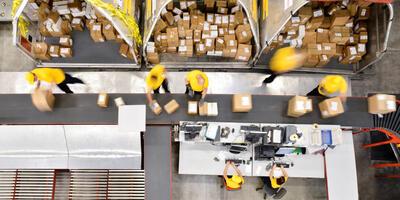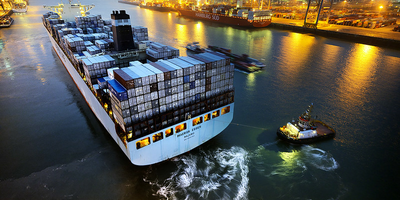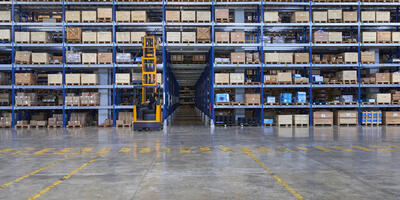
Smart logistics
Flanders is the ideal choice for creating added value in smart logistics, especially in these times of global competition and rapid technological development. Through the decades, Belgium’s northern region turned into a world-leading logistics hub thanks to its strategic location, its highly connected infrastructure and its leading position in terms of R&D and innovation – coupled with a history of operational excellence and the problem-solving attitude of its people.
Quick facts about logistics in Flanders
Tightly packed within a compact logistics network with a surface area of just 13,625 square km, Flanders offers access to:
- 3 international seaports – the Port of Antwerp-Bruges (Europe’s 2nd-largest port), North Sea Port and Port of Ostend.
- 3 international airports, including Brussels Airport in Zaventem.
- 650+ European distribution centers or EDCs.
- 1,395 km of navigable inland waterways, around 1,000 of which are used for commercial transport (source: Statistiek Vlaanderen, 2022).
- one of the world’s densest road and railway networks (source: IMD).
- 60% of Europe’s purchasing power within a radius of 500 km.
- an e-commerce market worth EUR 12.1 billion per year, representing - 168 million online purchases per annum and an average annual spending amount of EUR 1,445 per person (source: BeCommerce, 2021 Market Monitor).
Consequently, it shouldn’t come as a surprise that Belgium – of which Flanders is the northern region – ranks number 3 worldwide in the Logistics Performance Index (2018), published by the World Bank. For some of this study’s indicators, Belgium and Flanders even claim the global number 1 position, including:
- the ease of arranging competitively priced international shipments;
- the frequency with which shipments reach consignees within the scheduled or expected delivery time (timeliness).
What’s more, Belgium also ranks 10th in UNCTAD’s Liner Shipping Connectivity Index (2020).
International distribution centers everywhere
With its high-quality and strategically located infrastructure, Flanders enjoys great popularity as a distribution hub among international companies. Major corporations – such as Nike, Barry Callebaut, Beckton Dickinson, Pioneer, Bose, SKF, Bridgestone, Pfizer, Stanley Black & Decker, Volvo Cars & Trucks, Honda, Mazda, etc. – operate logistics sites and distribution centers in the region.
Zooming in one just two examples, Nike’s local distribution hubs have grown into the company’s overall European Logistics Campus, while Barry Callebaut decided to build the world’s largest chocolate warehouse in Flanders.
What’s more, the ten largest third-party logistics (3PL) companies in the world – as featured in a ranking by US consultancy firm Armstrong & Associates – all operate logistics and distribution activities in Belgium and its northern region of Flanders.
A finely tuned logistics ecosystem
Smart logistics goes beyond a finely meshed and efficient distribution network. The real added value lies in the qualities of the local talent: problem-solving skills, critical thinking, a pragmatic attitude and readiness to think together. In this sense, Flanders is a region of bridge builders and the region’s logistics sector is part of an ecosystem that represents the entire value chain.
To perpetuate and strengthen this role of integrator, Flanders’ distribution sector, knowledge institutions and industry partners are united in clusters (such as VIL) that actively share expertise and exchange experiences. Flanders’ top talent is also constantly looking for ways to prepare infrastructure and logistics flows for the future, investigating – among other projects – how complex flows can be automated, secured and made more sustainable.
VIL, spearhead cluster for logistics innovation
One of Flanders’ spearhead clusters, VIL is where logistics and transport innovation go full throttle. The cluster organization seeks to position Flanders as a global supply chain powerhouse and the ideal European logistics hub. In doing so, it works together with hundreds of member companies and organizations to tackle challenges linked to green supply chains, digital transformation, hinterland connectivity and ‘last mile’ delivery.
What’s more, VIL aims to lower the innovation threshold for smaller logistics players. How? By teaming up with larger firms and technological partners to introduce them to new processes and technologies.
At the cutting edge of smart tech
What do logistics experts and industry leaders from Flanders have in common? That’s easy: they all work at the cutting edge of smart technology by integrating the latest developments in the fields of tracing, robotics, drones, AI, the Internet of Things, micro- and nanotech, smart cities, smart energy and more.
In doing so, they also apply the principles of the circular economy and develop end-to-end solutions tailored to a variety of niches and target groups. The ultimate goal? To help logistics and distribution companies excel in terms of cost efficiency, productivity and convenience in order to meet the needs of their increasingly demanding customers.
|
Case in point: The Beacon helps build the smart port of tomorrow A vibrant AI and IoT community, The Beacon resides in the former toll house of port city Antwerp, just a stone’s throw from the Scheldt river. There, it focuses on – among other domains – smart port and logistics innovation. To highlight one example, The Beacon puts its shoulders to the wheel of a fast-track B2B program at the Port of Antwerp-Bruges, which helps maritime start-ups build local client relations and matches scale-ups with potential partners in segments such as Energy, Ports & Maritime, Logistics and Refinery. |
|
Demonstration center Log!Ville, where logistics and innovation cross paths Flanders’ spearhead cluster for logistics (VIL) is the driving force behind Log!Ville, Europe’s largest logistics experience and demonstration center. Among other things, it features an impressive demonstration hall, a unique visual experience and a state-of-the-art meeting center. “The 2,500-square-meter building is used for both live and virtual demonstrations and testing,” explains Log!Ville chairman Kurt Van Donink. “Here, companies small and large can discover and test the latest cutting-edge logistics technologies.” Hydrogen trucks, inventory management with drones, autonomous mobile warehouse robots, digital yard solutions… The list of possible things to explore at Log!Ville is seemingly endless. |
A tight network of e-fulfilment innovation partners
Smart logistics makes a key difference in e-commerce. An extensive offering and intuitive web shops have become a matter of course. Fast, correct and reliable delivery is how you truly differentiate your e-business and ensure its profitability these days. In this respect, Flanders has the long-standing expertise to help you build a modern supply chain that meets the needs of the e-market and transform your e-commerce company into an e-fulfilment business.
Robust R&D shoulders to lean on
From drones and cobots to AR, several industry partners are working on or driving new developments that can be applied to the supply chain of tomorrow. Many of these organizations collaborate with VIL, Flanders’ spearhead cluster for logistics innovation, on R&D projects. Examples include:
- imec, strategic research center for digital and nanotechnology. One of imec’s focal points is smart logistics, including the development innovations that drive e-commerce and e-fulfilment forward.
- VITO, multidisciplinary strategic research center for clean technology and sustainable development.
- Flanders Make, strategic research center for new and innovative production and product development technologies, focusing on smart vehicles among other applications.
- Sirris, a collective technology center that focuses, among other things, on collaborative robots for logistics applications.
What’s more, various players in Flanders offer unique expertise in terms of digitizing the logistics chain. Prominent examples include dedicated and sector-specific open data sharing platforms such as BRUCloud and NxtPort.
Flexible service suppliers to rely on
In e-commerce, it’s survival of the fastest and most cost-effective. Flanders’ strategic location offers you the low transport costs and short time to e-market to achieve just that. What’s more, the region is home to major package delivery firms (e.g. FedEx, DHL and UPS), pick-up/drop-off players (e.g. DPD, GLS, UPS Access Points and Mondial Relay) and logistics services providers (e.g. KatoenNatie, Kuehne+Nagel, H.Essers, Bleckmann and Dynalogic).
Furthermore, local courier providers and national postal company bpost share a strong reputation for reliable delivery in Flanders. The region also houses dynamic e-fulfilment players that offer automated warehouse management solutions and various e-logistics services: from web order management, stocking and order picking to shipping, returns management and reporting. Major examples include: WebShip, BME, VdH, B2C Europe, SprintPack, DistriMedia, Active Ants (part of bpost), ShopWeDo and BD Logistics.
Financing your logistics activities in Flanders
If you decide to establish activities or headquarters in Flanders, your logistics activities can reap the rewards of:
- government subsidies and support for investments in R&D and innovation, strategic transformation, ecological efforts, growth and other domains.
- tax incentives to fund a broad range of business activities.
- fiscal options to help you cut labor costs.
Request a free copy of our brochure to discover more about government support in Flanders.
Tax incentives for research-intensive activities
Flanders offers access to several tax incentives that are particularly relevant to research-intensive activities such as smart logistics. Examples include:
- the innovation income deduction – up to 85% of a company’s net innovation income can be exempt from corporate tax.
- the R&D investment deduction – 13.5% of the investment value (at once) or 20.5% of the annual depreciation (staggered).
- the R&D payroll tax exemption – 80% of the withholding tax on professional income for researchers and academic personnel.
- support measures through spearhead cluster VIL for both R&D and ICON projects.


